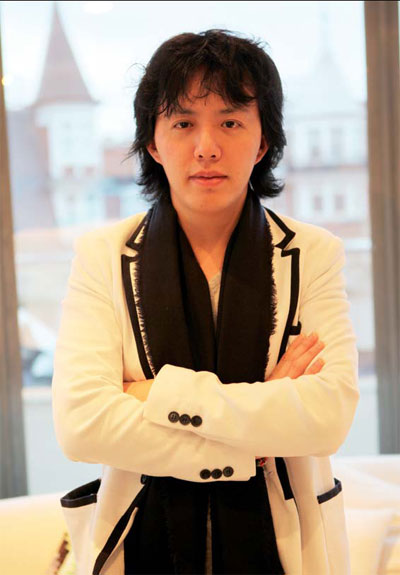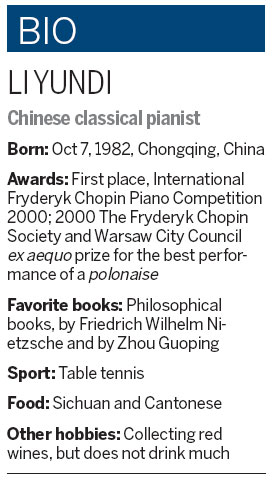A cultural envoy plays it lightly
Updated: 2012-03-02 07:59
By Diao Ying and Zhang Haizhou (China Daily)
|
||||||||
|
Li Yundi is in Europe to promote his latest album the Red Piano, a collection of Chinese music. [Li Min / China Daily] |
Pianist pledges to promote chinese music globally
Li Yundi winds down after his daily three hours' practice. The classical pianist is garbed in a white slim-fit suit top, tight black trousers and a pair of black suede shoes. On a tea table lie his Emporio Armani sunglasses.
In an interview lasting almost an hour on the top floor of the EMI Music building in London's posh West End, Li's answers are delivered allegrissimo, or very quickly, the lyrics being predominantly Chinese, but with snatches of English along the way.
But back to the looks. Li says he is not attached to any particular "famous brand", but adds that he is a kind of representative for the Italian men's fashion line Ermenegildo Zegna.
"They design my suits and tailcoats that I wear at performances. I think the brand fits my style well."
Just when you start to think Li's kit couldn't be any more Western, a bracelet that is green and watermelon red jumps out. This Chinese symbol of good luck is on his right forearm.
Li soon makes it clear that he thinks there is more to Chinese culture than good luck charms.
"Chinese culture is as great as others. We have many great books and poems ... but there is only one concerto composed by the Chinese. There should be more," he says, referring to the Yellow River Piano Concerto, based on a patriotic cantata composed by Xian Xinghai in 1939.
Ten years after becoming famous by playing the music of Western composers, Li is doing a bit of role reversal, playing Chinese music to Western audiences.
"They listen to Beethoven, Chopin and Bach every day, and they might get excited with something different," Li says.
He is in Europe to promote Red Piano, his latest album and his first collection of Chinese music, and he expects his fans in Europe to get to know more about China through his performance.
|
|
The album includes In That Place Wholly Faraway, a folk song from the western province of Qinghai that he has played at his solo concerts as encores, and The Yellow River Piano Concerto.
Li says he chose all of the tracks, and it took him about a week to finish the recording in the National Center for the Performing Arts, next to the Forbidden City in Beijing.
Apart from London, he will perform in 10 other European cities, including Turin, Paris, Munich, and Leipzig during the three-week tour.
Li has long acted as a musical envoy, putting Chinese audiences in touch with Western classical music. For example, without his delicate touch the finer points of Chopin's works would simply have been lost to them.
It has been more than a decade since Li won first prize at the International Chopin Piano Competition in Warsaw in 2000, when he was 18, but he says his understanding of music has changed little since then.
Music, he says, is a means of emotional exchange.
"Playing music is like a person growing up. It is a process that keeps changing and evolving."
He says he now has a clearer life-long ambition: promoting Chinese music, especially piano music, internationally.
"Our culture is there. And we need to illustrate it with music."
Others have done it, he says, citing Liszt, who was inspired by German literature, and Tchaikovsky, who turned themes in Russian culture into melody.
Li may even compose music himself at some point. "I think about writing when I have time. I am in no hurry. But I do have the dream and the passion."
He also spends time nurturing talented young musicians. He holds master classes in many places, and he takes part in charity events to help people realize their musical ambitions.
The environment for classical music in China is improving, he says. When he started 10 years ago, classical music in the country was in its infancy.
"The market and the reaction of audiences is completely different now."
When he was starting out it was difficult to find albums, but these days few students have that problem.
"Classical music in China is starting to develop, and the next generation will only get better."
Li focuses on piano solos and, unlike Lang Lang, who plays about 50 concertos, Li's list has hardly changed in recent years.
"Instead of exploring a lot of different forms, I prefer to focus on one thing and do it well."
Lang, who was also born in 1982, and Li are without doubt the most well-known Chinese pianists, and at times the media have portrayed them as rivals.
In 2008 Anne Midgette of The Washington Post, writing of a "populist sellout vs musician's musician", said: "Lang Lang is, if you will, the Pavarotti to Yundi Li's Domingo - the one who is embracing the mass market at the expense, many would say, of artistry."
Lang was at the center of a controversy recently when he was quoted as saying on weibo, the Chinese equivalent of Twitter, that he, not Li, was the first choice to pair with the US-born Chinese singer Wong Leehom for the China Central Television 2012 Spring Festival Gala. Li performed at the event.
Lang said he was unable to attend because of a previous engagement.
When the matter is raised with Li, he adopts the role of the diplomat.
"I've never met him or even spoken to him ... I wouldn't put any faith in groundless rumors."
Speaking of his performance at the gala, Li says he was invited by the Chinese broadcaster several months before it was staged on Jan 22, Chinese New Year's eve, to pair with Wong, who is "a long-time good friend".
"We know each other quite well and it took us only a week to practice."
Asked if, in the future, he would like to play with Lang, Li says he is open to the idea.
He is unwilling to compare himself with Lang, but suggests that they have at least one thing in common: both are trying hard to promote Chinese music internationally.
"I would offer my support to anyone who is doing this."

 Relief reaches isolated village
Relief reaches isolated village
 Rainfall poses new threats to quake-hit region
Rainfall poses new threats to quake-hit region
 Funerals begin for Boston bombing victims
Funerals begin for Boston bombing victims
 Quake takeaway from China's Air Force
Quake takeaway from China's Air Force
 Obama celebrates young inventors at science fair
Obama celebrates young inventors at science fair
 Earth Day marked around the world
Earth Day marked around the world
 Volunteer team helping students find sense of normalcy
Volunteer team helping students find sense of normalcy
 Ethnic groups quick to join rescue efforts
Ethnic groups quick to join rescue efforts
Most Viewed
Editor's Picks

|

|

|

|

|

|
Today's Top News
Chinese fleet drives out Japan's boats from Diaoyu
Health new priority for quake zone
Inspired by Guan, more Chinese pick up golf
Russia criticizes US reports on human rights
China, ROK criticize visits to shrine
Sino-US shared interests emphasized
China 'aims to share its dream with world'
Chinese president appoints 5 new ambassadors
US Weekly

|

|









